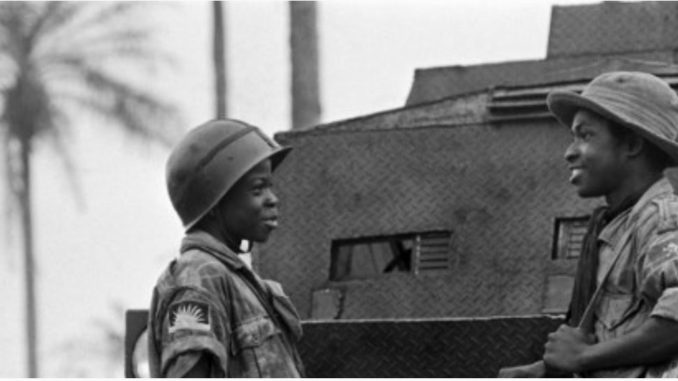
May 30 this year fell on Thursday and I was one of those who elected to stay at home to remember. To remember my family members, my classmates, the friends of my youth, and all who perished in the Nigerian/Biafran war. Many countries have Memorial Day, Remembrance Day, or May Day. It does not matter what the name is but it is usually the day dedicated to remember all those who died in the wars of the countries.
In my case, I remember the aunties who could not handle the young men’s deaths being announced almost every day in 1966/1970. I remember Chidu Aduba, Adaeze Aduba, Onyejelu Aduba, Onyeobialu Anyaragbu, etc. I remember cousins who died especially Clifford Orji, Henry Onyebeke, and Augustine Madu. I remember a classmate, David Nwaigbo. I remember so many friends, a list which is too long for this small piece.
It is not just the Adubas and friends of the Adubas that perished. There were over three million easterners who died in warfronts, some were killed by bombs dropped in marketplaces (Cousin Henry Onyebeke, a 14-year-old high school student) was killed in Nkwo Inyi Market where he went to pick up a couple of food items for the family; some died due to starvation (a weapon of war); some died due to diseases and lack of medical care, and more died for various other reasons.
So, there is a reason to have a day to remember all these people who died.
It was not just Biafrans who died in the war. Nigerians died also and they ought to be remembered too. The current politics makes it seem as if May 30 is for Biafrans. It ought not to be. It should be for all Nigerians. Nigeria is the only country that has not set a day apart to remember her history. We know that those who ignore history are bound to repeat it. These days, one gets the impression that Nigeria is on a mission to repeat its sad history.
Nigeria needs to recognise May 30 as her day of remembrance. If not May 30, a different day that is acceptable to the majority could be chosen, but there is a need for such a day of commiseration, reflection and mourning.
It is not only the dead that we remember. We also remember the heroic deeds by our community. On the Nkwo Day that Henry Onyebeke was killed by bombs, many members of the Red Cross gathered at the market to care for the hundreds of the wounded, ordinary folk flocked to clinics and makeshift hospitals to donate blood. The town criers in Achi, Inyi, and Awlaw (Oji River) went around calling for blood donors, food items, medical supplies, etc. The people responded enthusiastically. My uncle, Thompson Ekekezie, crisscrossed on foot the entire Biafra looking for Henry’s body at all known hospitals and clinics, a journey that must have exceeded 1,000 miles.
There are other good warriors like the World Council of Churches, CARITAS, International Red Cross, pilots who flew in food and medical supplies in darkness, Doctors without Borders, World Press journalists, missionaries, etc. who fought just as hard to reduce human sufferings. We should remember the peace mediators from various organisations and individuals like Wole Soyinka (now a Nobel laureate) who was jailed for speaking the truth to power. We cannot forget the efforts of some soldiers who would not go along with some of the military tactics employed in places like Asaba against civilians (Gen. Williams comes to mind). There were so many peoples, incidences, organisations that went well beyond normal to make the war less brutal than the likes of Colonel Benjamin Adekunle would have loved it to be.
We remember them all. We remember Rev. Fr. Gerry Gogan.
War is evil. We pray that no leader ever leads their people to war. There is never a reason to slaughter God’s children not even herdsmen desires or Boko Haram fighters can justify man’s inhumanity to man. Let us pray for President Muhammadu Buhari and President Donld Trump and ask God to pull them back from the abyss they are heading. We must pray for Pope Francis; that world leaders may harken to his preaching for peace.
Benjamin Obiajulu Aduba
Boston, Massachusetts
END

Be the first to comment